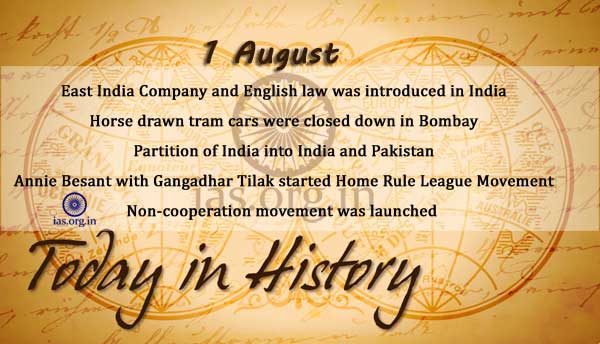1498
Italian explorer Christopher Columbus sets foot on the American mainland for the first time, at the Paria Peninsula in present-day Venezuela. Thinking it an island, he christened it Isla Santa and claimed it for Spain.
1672
The East India Company and the English law was introduced in India for the first time. It was set up as it was directed by the Court of Judicature.
1774
On this day in 1774, dissenting British minister Joseph Priestly, author of Observations on Civil Liberty and the Nature and Justice of the War with America, discovered oxygen.
1846
Dwarkanath Tagore, a Hindu philanthropist, died in London.
1889
Kamala Nehru, wife of Pandit Jawaharlal Nehru, great revolutionary, freedom fighter and social worker, was born.
1905
Horse drawn tram cars were closed down in Bombay. This service was started on May 9, 1874 with 20 tram cars and 200 horses. The very first day of its run, the number of passengers carried was 451 and the amount earned was Rs. 85/- on the last day it had 1360 horses and carried 71,947 passengers and earned Rs.4,260/.
1914
First World War erupted in Europe
1916
Mrs. Annie Besant in cooperation with Bal Gangadhar Tilak started the Home Rule League Movement with Dadabhai Naoroji as its President.
1920
Bipin Chandra Pal opposed to the Non Co-operation Movement and retired from politics, but movement was approved by Congress.
1920
Under the leadership of Gandhi, the non-cooperation movement was launched against Lord Chelmsford. “Firmness in truth,” was his strategy of non cooperation and non-violence against India’s Christian British rulers. Later, he resolved to wear only ‘dhoti’ to preserve homespun cotton and simplicity, followed with grassroots agitation. This began with renunciation of honorary titles like ‘Sir’ given by the British. Thereafter, it was followed by the boycott of legislatures, elections and other Government works. Foreign clothes were burnt and Khadi became a symbol of freedom. The movement was a great success despite firing and arrests. By the end of 1921, all important national leaders, except Gandhi, were in jail, along with 3000 others. However, in February 1922, at Chaurichaura, Uttar Pradesh, violence erupted and Gandhi called off the movement.
1920
Bal Gangadhar Tilak, British-Indian Hindu leader, died at Bombay.
1920
Kirloskar, monthly magzine, was published.
1920
Gandhiji addressed letter to Viceroy surrendering “Kaisar-E-Hind” Medal, “Zulu War” Medal and “Boer War” Medal and launched the All India Non-Violent Non-Coperation Movement.
1939
Bombay began Prohibition, first since U.S. law was repealed.
1947
Partition of India into India and Pakistan. Power transferred. Lord Mountbatten became Governor General of India and Muhammed Ali Jinnah, Governor General of Pakistan.
1953
All Private Airlines were nationalised by establishing of All Airlines India International.
1953
Bombay Government decided to abolish ”jagirs” in merged areas.
1957
National Book Trust inaugurated.
1958
Ramon Magsaysay Award for community leadership was given to Acharya Bhave.
1962
Establishment of Maharashtra State Industrial Development Corporation.
1963
Soviets offer India arms to block China.
1966
Himachal Pradesh Krishi Vishvavidyalaya (HPKV) was established at Palampur under the aegis of Punjab Agricultural University, Ludhiana, to cater to the need of hilly areas of erstwhile Punjab.
1970
Bhopal University was established.
1971
A severe flood of the Red River in North Vietnam killed an estimated 100,000 people on this day in 1971. This remarkable flood was one of the century’s most serious weather events.
1975
The United States, the Soviet Union, Canada and every European nation (except Albania) signed the Helsinki Final Act on the last day of the Conference on Security and Cooperation in Europe (CSCE). The act was intended to revive the sagging spirit of detente between the Soviet Union and the United States and its allies.
1986
Amnesty scheme for evaders of taxes announced.
1994
The Railway passenger insurance scheme came into force.
2000
The Lok Sabha adopted Uttar Pradesh State Reorganisation Bill paving the way for the creation of Uttaranchal the 27th State.
2007
On this day in 2007, Citibank opened China’s first drive-through automated teller machine (ATM) at the Upper East Side Central Plaza in Beijing.
Related Articles:


